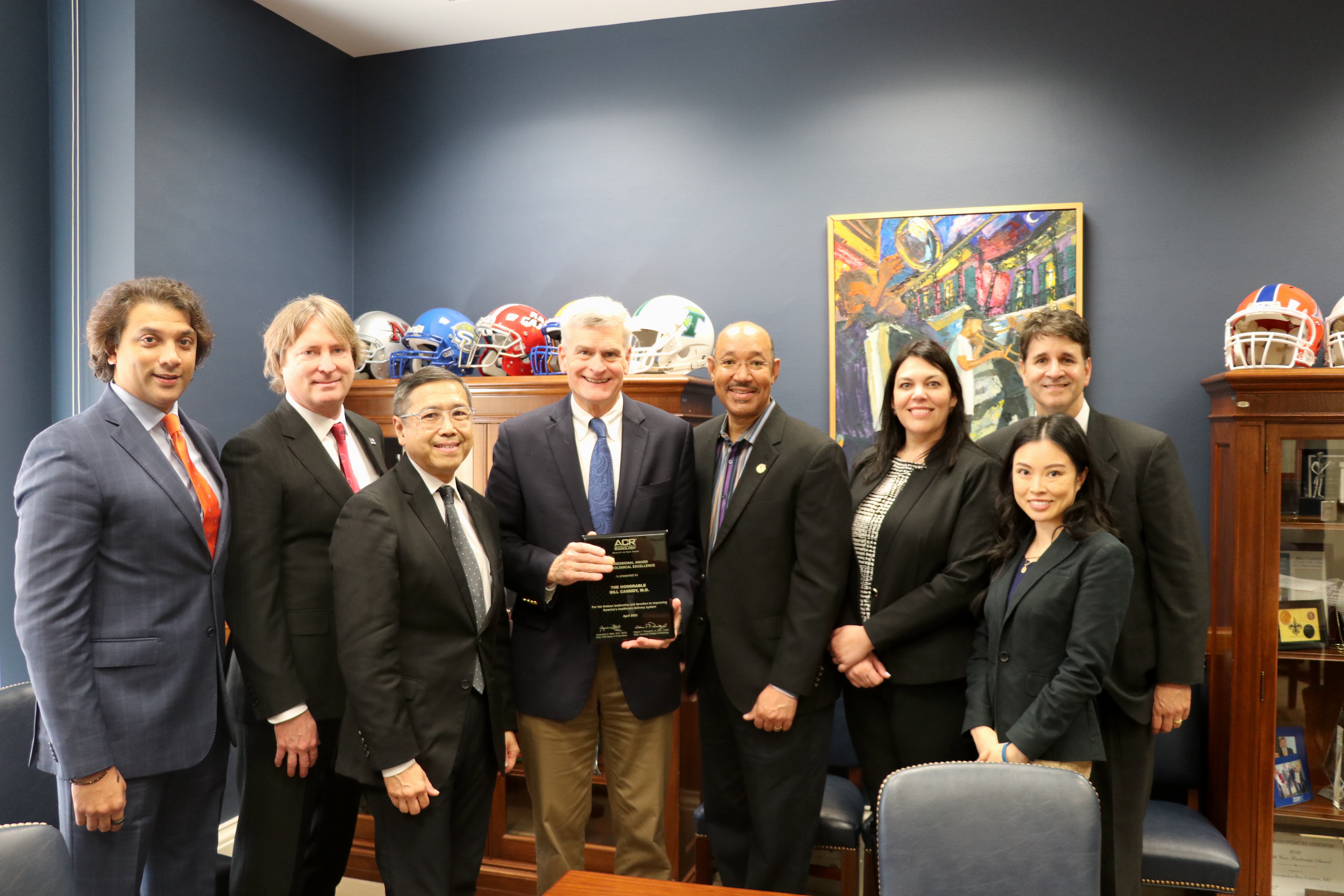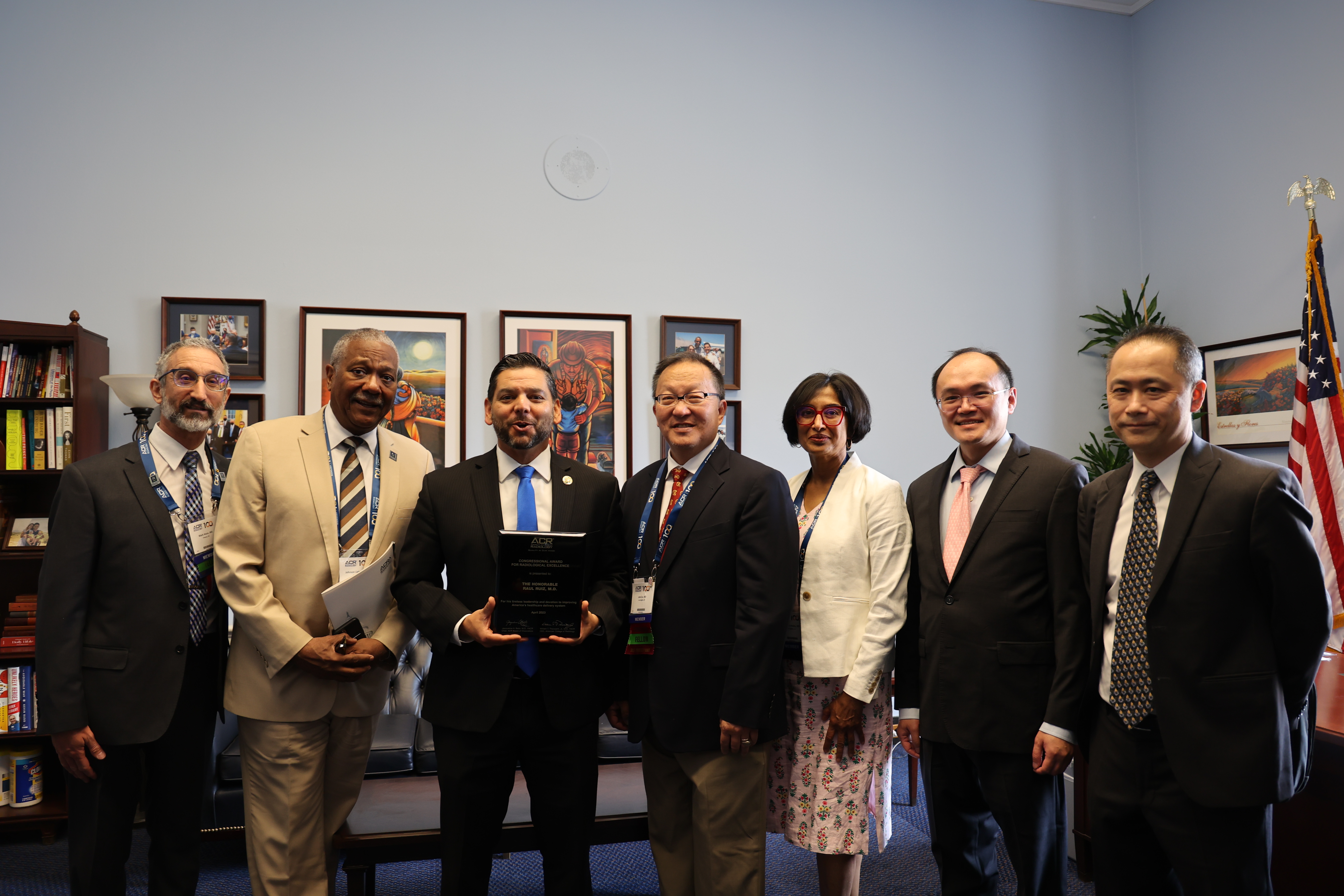Federal Legislative Update
CARE Award Recipients
 Senator Bill Cassidy, MD (R-LA) with members of the Radiological Society of Louisana.
Senator Bill Cassidy, MD (R-LA) with members of the Radiological Society of Louisana.
 Rep. Raul Ruiz, MD (D-CA) with members of the California Radiological Society.
Rep. Raul Ruiz, MD (D-CA) with members of the California Radiological Society.
Senator Cassidy and Representative Ruiz are recipients of the ACR's Congressional Award for Radiological Excellence (CARE) for their legislative support and efforts on surprise billing and Medicare reform.
ACR-Led Coalition Continues Fighting Medicare Reimbursement Cuts
As 2022 drew to a close, the ACR-led coalition continued to work together to urge Congress to add an additional 4.5% to the MPFS CF for 2023, which would encompass both the expiring 3% and the budget neutrality adjustment in the 2023 MPFS final rule; essentially restoring the MPFS CF to 2022 levels.
Rather than stop the 4.5% reduction, Congress voted to mitigate the cut by passing a 2.5% CF increase for 2023 (a 2% cut from 2022 levels) and a 1.25% CF increase for 2024 (a 1.25% cut from 2023 levels).
ACR will continue to lead the coalition of physician and non-physician clinicians working toward substantive reform to the MPFS to ensure radiologists and others receive much-needed fiscal stability.
For more information about ACR’s actions to fight Medicare reimbursement cuts, please contact
Rebecca Spangler, ACR Senior Government Affairs Director.
No Surprises Act Legal Update
On February 6, 2023, a federal court invalidated parts of the No Surprises Act (NSA) regulations regarding the Independent Dispute Resolution (IDR) process for resolving payment disputes between providers and insurers. Those regulations unlawfully placed a “thumb on the scale” for the controversial Qualifying Payment Amount (QPA) over other factors arbitrators must consider. The government then instructed IDR arbitrators to hold payment decisions until it issued further guidance to comply with the court’s decision. ACR had joined this lawsuit by the Texas Medical Association (TMA) as a friend of the court, with the American Society of Anesthesiologists (ASA) and American College of Emergency Physicians (ACEP).
Recently, the federal government updated its guidance for the IDR process under the No Surprises Act and instructed IDR entities to resume issuing payment determinations for applicable out-of-network items or services furnished on or after Oct. 25, 2022, effective March 17.
The new guidance instructs IDR entities to consider both the QPA and additional information relating to the offers submitted by the parties. Additional information that may be considered includes the level of training, experience, and quality outcomes measurements of the provider or facility that furnished the item or service, the market share held by the provider or facility, the acuity of the patient receiving the item or service, the teaching status, case mix and scope of services of the facility, and demonstration of good faith efforts made by the provider or facility, or the plan to enter into network agreements with each other. The new guidelines also instruct the certified IDR entities to provide an explanation of the rationale for their decision, including what information was used to select the offer that best represents the value of the qualified IDR item or service. The weight given to the QPA and any additional information submitted must be provided as part of the explanation.
ACR, with ASA and ACEP, have also supported as friends of the court in two other NSA lawsuits by the TMA. These cases challenge restrictive rules on “batching” claims for arbitration and the 600% administrative fee increase for the IDR process that CMS announced in December 2022. The court has set an April 19 hearing for the plaintiffs and government to argue why each party should receive a favorable judgment. The court then will decide the matter within the following weeks.
ACR Urges Congress to Address Physician Payment Cuts Associated with Clinical Labor Policy
Despite the efforts of the
American College of Radiology® (ACR®) and other national medical societies, Congress did not include legislative language in its end-of-the-year omnibus package to address payment cuts associated with a Centers for Medicare and Medicaid Services (CMS) clinical labor pricing update. ACR and other stakeholders had requested new funding for the Medicare Physician Fee Schedule (MPFS) for the explicit purpose of increasing the non-facility/office-based practice expense relative value units (NF Pe RVUs) negatively impacted by CMS' clinical labor update policy. Without congressional action, the second year of CMS' phased-in implementation of its clinical labor pricing update included in the 2022 MPFS final rule will continue.
Clinical labor staff, medical supplies, and equipment costs are three components of direct practice expense (PE) inputs, which are costs directly associated with the provision of a service or procedure. They are budget neutral, which means that an increase in payment for one component typically means a proportional decrease in payment for the other components. CMS recently updated clinical labor staff wages, and the budget neutrality application has resulted in significant code level reduction for codes with high medical supplies and equipment costs, including some interventional radiology and radiation oncology codes.
For more information, please contact
Ashley Walton, ACR Government Affairs Director.
